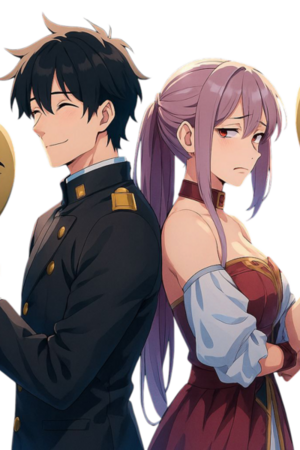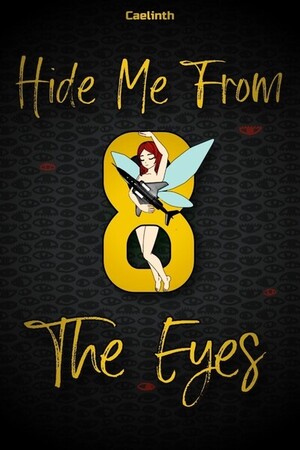Chapter 6:
Chapter 6: Fatal Heist
Escaping from this other world.
*Kiro's POV*
The hotel suite was bright, almost unnaturally so. Soft golden light spilled from the chandelier, bouncing off the polished surfaces. The scent of vanilla and jasmine floated in the air, sweet and heavy, almost cloying. My chest tightened before I even stepped fully inside.
“Welcome back,” a familiar voice purred. Akiko stood near the table, her smile sharp but inviting, her eyes sizing me up like she knew every worry etched into my face.
I swallowed hard. “Akiko…”
“Yes,” she said lightly, stepping closer. “I realized I never properly introduced myself the first time. Akiko Saito.” She gestured elegantly. “And this,” she added with a flourish, “is my friend, Misha Ivanova.”
Misha, tall and poised, gave a small nod. Her hair fell in soft waves over her shoulders, and her smile was calm but calculated. “Pleasure,” she said, her accent curling around the words. “I hear so much about you, Kiro. All good things, of course.”
I barely nodded. My eyes darted to the table. Envelopes of cash gleamed under the light, almost hypnotic. My hand itched to reach out… but my mind slammed into Aoi’s face, her stubborn, trusting expression haunting me.
Akiko stepped closer, placing a hand delicately on the edge of the table. “We’re here for a simple transaction,” she said sweetly, though there was an edge to her tone. “I want a celebration, a memorable birthday. And we’re willing to pay handsomely for it.”
Misha tilted her head, her eyes narrowing slightly, scanning me. “We don’t like games, Kiro. We know what you can do… and we expect nothing less tonight.”
I swallowed. My throat dry, my fingers trembling. The money. The pressure. The hospital bills. And Aoi’s voice in my mind again: “I’ll follow you, Kiro, wherever you go.”
I closed my eyes, letting out a whisper, almost inaudible: “I’m sorry, Aoi.”
Akiko’s smile didn’t falter. “Don’t keep us waiting, darling. Time is money, and tonight…” She leaned closer, voice low and teasing, “we’re very generous.”
I nodded, my hands shaking slightly. Every muscle in my body screamed, every thought warning me, but the money, the debt, the impossibility of keeping everyone safe pressed down until I had no choice.
“Let’s… get this over with,” I said flatly, my voice steadier than I felt. My body moved forward, the envelopes of cash now a grim promise of what I had to do.
Misha watched silently, her eyes calculating, and Akiko’s gaze lingered on me, sharp and expectant. And in my mind, only one face remained: Aoi.
The night blurred.
I don’t know when my resolve cracked, only that the scent of jasmine and sweat clung to me like guilt. I gave them what they wanted, every touch mechanical, every breath a compromise. Time bled together under the golden light of the chandelier until it felt like we were all drowning — drowning in bodies, in perfume, in silence where my conscience should have been.
They laughed at first. They whispered praises and little gasps of approval, but I stopped listening. All I could hear was the clock ticking somewhere in the suite, each second like a hammer blow counting down to Miya’s surgery deadline. My body moved harder, rougher, my mind somewhere else entirely — in a hospital corridor, outside an operating room, where my sister lay between life and death.
Through the haze, my eyes caught something glinting in the corner. Jewelry. Dozens of pieces, necklaces like coils of light, bracelets stacked in velvet bags, diamonds carelessly spilling from a pouch. More money than I’d ever seen in my life sitting in arm’s reach while Miya’s fate balanced on a bill no one in our family could afford.
Something in me broke then.
I went harder, moving like a man possessed. They gasped, protested, but the anger and desperation inside me only surged. They’d paid for a night; I’d paid with my dignity — but this? This was survival.
One of them whispered for me to stop. Another tried to push me off weakly, but I didn’t stop. I didn’t hear them anymore. I wasn’t even there anymore. I was just a storm of motion, empty and mechanical, a machine running on borrowed rage until the world around me went silent.
By the time I stopped, the chandelier light had dimmed to a muted glow, and both Akiko and Misha lay sprawled, unconscious, their perfume still heavy in the air. Their perfect hair was tangled, their makeup streaked — they looked less like predators now, more like victims of their own game.
I stood, chest heaving, my hands trembling. My reflection in the suite’s full-length mirror didn’t look like me anymore — just a stranger with hollow eyes.
Slowly, I moved to the velvet bags. Jewelry glinted like frost in moonlight, like the promise of salvation. My fingers shook as I stuffed handfuls into my pockets, into my jacket, anything I could carry. Every necklace, every bracelet, every glittering piece felt heavier than gold; each one was another brick in the wall I’d just built between who I was and who I’d become.
When I was done, I took a scrap of paper from the hotel stationery. My handwriting came out jagged, uneven:
I’m sorry.
I left it on the bedside table, next to the unopened bottle of champagne they’d ordered.
Then I began to clean. I wiped surfaces, straightened sheets, tried to erase the fingerprints and sweat that clung to every inch of the room. I gathered anything of value — cash, watches, even the room keycard — until an hour had passed and the suite looked less like a battlefield and more like a crime scene waiting to be discovered.
I slipped into my clothes, stuffing the last of the jewelry into an inner pocket. My hands were still shaking as I reached for the door handle.
Just get to the hospital, I told myself. Just get Miya into surgery. Just make it count.
But the second I stepped into the hallway, I felt it — eyes on me.
Down at the far end of the corridor, three men in black suits were walking briskly in my direction. Their movements were too sharp, too coordinated to be hotel staff. One of them reached for a phone, his gaze locked on me.
My pulse spiked.
I started walking faster, my heart hammering against my ribs. The jewelry clinked softly in my pockets like a guilty secret. My shoes echoed on the marble floor.
Another man appeared from the stairwell ahead, his expression blank but his shoulders squared.
I realized, too late, that one of them must have woken up.
The hallway suddenly felt like it was closing in on me, every polished surface reflecting my face like a fugitive’s mugshot.
I exhaled sharply, whispering
to no one, “I’m sorry, Aoi.”
Then I bolted into the hallway, my shoes slapping against the marble floor, each echo a countdown. My heart was a jackhammer in my chest, every beat screaming that they were right behind me. I could hear the soft click of polished shoes, the low murmur of radios, and the faint hiss of an elevator opening.
My hands instinctively went to my pockets, checking the weight of the jewelry. It rattled like tiny chains of guilt. I cursed under my breath — I didn’t have time to think about the crime, only about survival, about getting to Miya.
Ahead, the hallway forked. I veered left, pounding my way down the corridor, almost colliding with a maid pushing a cart of cleaning supplies. She squealed and scurried out of the way. I barely had time to register the glint of silver trays and polished handles — the environment was deadly, but I didn’t care.
The first suited man was close enough I could see the crease of his brow. He moved with precision, blocking exits as if he’d been trained for this exact chase. I ducked into a service stairwell, fumbling the door open. My lungs burned instantly, every inhale tasting of metal and desperation.
Down three flights. Two. My legs were a blur, carrying me faster than I had intended. My ankles slammed against the concrete steps, sharp cracks running up my legs, but I ignored them. The regeneration that had always been a silent gift surged, dulling the pain, pushing me forward. The cold sweat plastered my hair to my forehead, but adrenaline kept me moving.
I emerged into a service corridor on the first floor, dimly lit, a faint smell of disinfectant mixing with the lingering perfume of the suite. Two more men appeared at the stairwell entrance, blocking my route. No time to hesitate.
I charged, shoulder-first, ramming the first man into the wall. He grunted, stumbling, and I didn’t stop. The second man swung at me; I ducked, grabbed his arm, twisted, and sent him crashing against the stainless steel utility door. Pain flared in my shoulder, but it was nothing. I couldn’t stop.
I reached the exit to the alley behind the hotel. Rain had begun again, soaking the street in sheets of water that reflected the neon glow of the city. The smell of wet asphalt hit my nose, mixing with the coppery tang of blood — mine, theirs, I wasn’t sure.
Cars honked as I barreled into traffic, weaving between vehicles, leaping over wet bumpers, sliding under headlights. One SUV nearly clipped me. I rolled, scraping my elbow, teeth gritting as the cold pavement bit through my jacket. My legs screamed, my lungs burned, but I could see the edge of the street — the darkened alley where I could vanish.
Behind me, I heard them shouting, calling my name, but it was muffled by the pounding rain. I vaulted over a low chain barrier, landed hard, and immediately sprang toward a fire escape. My fingers gripped the cold metal, nails biting into rust, my body swinging upward, almost losing balance as a slick puddle caught my foot.
I climbed three floors, each rung testing my strength and endurance. My muscles burned in new ways — exhaustion had finally found me. For the first time in years, I felt tired. My regeneration kept me going, but fatigue gnawed at my edges, whispering that I couldn’t outrun this forever.
At the roof, I paused, chest heaving, rain plastering my hair to my skull. Below, the alley shimmered, the silhouettes of the suited men visible if they dared follow. I looked around — the city sprawled endlessly, neon and wet, offering escape routes in every direction.
I spotted a ladder to the next building. No time to calculate, no time to think. I ran, jumped, and grabbed it mid-air, clutching it as I swung over the gap. Pain seared across my wrists and shoulders, but I held tight. My legs pushed off, landing in a crouch, sliding against the edge of the roof. The impact rattled my knees, but I rolled, standing immediately, scanning for the next path.
The chase continued like a nightmare stitched from rain, neon, and panic. I leapt across rooftops, my body moving with instinctive precision. Every step, every leap, every narrow escape pushed me further — and every step, every second, reminded me of Miya.
She was in the hospital, fighting for her life, and here I was, running like a phantom through the city, stealing what I needed to save her. I couldn’t fail her. Not now.
Finally, after what felt like an eternity, I saw an open construction scaffold. A shortcut down. I dropped, pain exploding in my ankles — fractures, bruises, nothing my body couldn’t ignore. I gritted my teeth, forced myself forward.
Behind me, I heard shouting. One of them was no longer cautious — they were coming fast. I sprinted through back alleys, rainwater splashing up, the night alive with sound and danger. My lungs burned, but I didn’t stop. I couldn’t stop.
I ducked into a dimly lit street, heart hammering in my chest, and finally, for a fraction of a second, I allowed myself a breath. I could see a taxi idling, engine running. Salvation.
I bolted, sliding through the rain toward the cab. The men in suits appeared around the corner, but I didn’t care anymore. I jumped in, hands shaking, soaked through, pockets heavy with stolen jewelry.
“Take me to the hospital!” I barked. My voice was ragged, but there was no mistaking the urgency.
The driver nodded, and we were off, tires screaming against wet asphalt. Behind us, the city lights blurred into streaks of color, rain hammering against the windshield. I pressed my forehead against the glass, eyes shut, letting the motion carry me, heart still pounding like a drum.
I’d escaped the hotel. I’d survived the chase. But the night was far from over. Miya’s life, the surgery, the debt — it all waited for me at the hospital. And for the first time in years, I knew the cost of what I’d done was more than just money.
The cab crawled through the city like a dying insect. Traffic was a nightmare, engines growling, horns blaring, headlights reflecting off the wet asphalt. My eyes kept darting to my watch — the clock wasn’t slowing, the seconds didn’t care. Every tick was a reminder that Miya’s life was slipping away.
Slamming my fist against the glass. “Move!”
The taxi driver glanced at me, hands tight on the wheel. I shoved the door open. “I’m going on foot!” I barked, tossing him a tiny diamond, already slipping into the rain-soaked streets. Water poured down my hair, stinging my eyes.
I sprinted, boots slapping the pavement, heart hammering violently — no, not just hammering. My chest felt like it was being compressed in a vice, ribs straining against a growing pressure. Every inhale felt shallow, lungs searing with effort, yet my body refused to stop. The rain beat against me like a thousand needles, the sound deafening, drowning out everything else.
The rain hit me like steel, each drop a tiny hammer against my skin, but I hardly felt it anymore. The chaos of the city blurred into streaks of light and shadow. My chest burned, and my lungs screamed for air I couldn’t fully take in. Sirens, shouting voices, the screech of tires—all a distant, pounding echo in my ears.
I didn’t see the gunman until it was too late. A flash, the sharp crack, and then fire in my chest. My body tensed as the bullet tore through muscle and tissue, but I… I shouldn’t have died. My body—my power—rushed to mend me. My chest began to knit together, the wound closing, and yet something felt… wrong.
A numbness spread from my heart, crawling like ice into every vein. My vision wavered, the edges of the world darkening. The blood in my ears was not just from the wound but from the shock, the panic, the fury of survival itself. I tried to run, tried to think, but the city, the rain, the chase—it all felt unreal, as if I were watching someone else’s life in a dream.
And then the truck appeared. Blinding headlights, a monstrous engine roaring, the smell of wet asphalt and diesel. I didn’t have time to move. Impact.
The world exploded in pain. Every bone, every muscle, every fiber of my being screamed. My body was flung through the air like a ragdoll. Rain and blood mixed on my face; everything spun. My chest hit the pavement first. My heart… I felt it shatter, a jagged splinter of agony twisting inside me.
I tried to breathe. I tried to move. I felt the regeneration, power spreading to every broken point—but the heart… it refused. The numbness now was absolute, crushing. I was aware of every sound: the rain, the screaming tires, the shouting. But none of it mattered.
I thought of Miya. Her face, wet with rain, her little hand gripping mine. “Be safe, onii-chan,” she had said once. I couldn’t reach her. Couldn’t tell her it was okay. That she was going to be safe anyway.
A flash of memory—Aoi, her stubborn head against my shoulder, her words, her life I had pushed away so she could live free. I whispered, though no one could hear. “I’m sorry… Aoi.”
The rain filled my mouth as I tried to call out her name, tried to focus, tried to survive—but my vision blackened in slivers. The sky, the storm, the city lights—all collapsed into darkness.
Pain clawed through me, but then… silence. Absolute, cold silence. No rain, no sirens, no shouting. Just the fading memory of faces I loved and swore to protect.
I thought of Miya again. And somewhere in that final breath, in that last flicker of awareness, I prayed—prayed that she would live, that she would laugh again, that she would be safe.
And then there was nothing.




Please sign in to leave a comment.